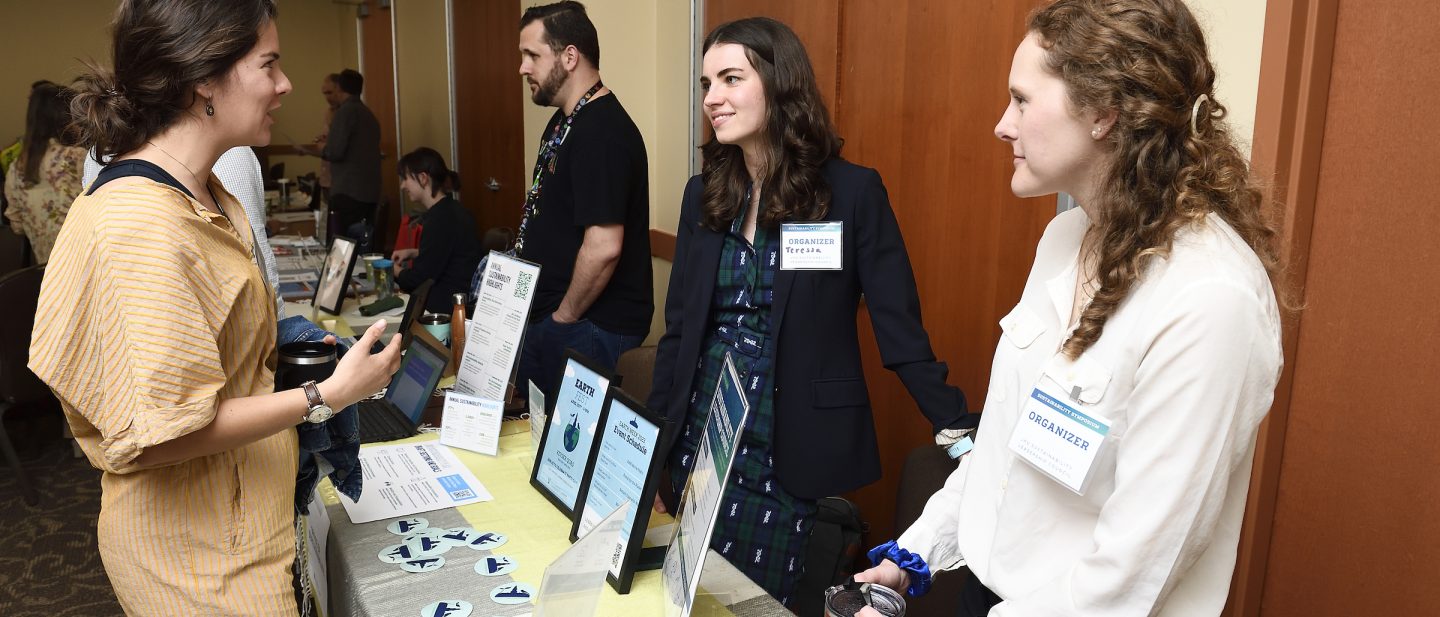
As the realities of pressing environmental issues such as climate change, pollution, and extinction continue to strike concern in our community, over 125 people stepped forward to help shape JHU into a leader in sustainability practices, teaching, and research as part of the Sustainability Leadership Council in the 2023 Academic Year.
Over four years ago, faculty, staff and students proposed the creation of the council in order to connect individuals from across university divisions in order to achieve transformative and systemic change. Since the council formed in Fall 2019, the group has impacted the campus landscape through a myriad of policies, practices, programs, and initiatives. Some examples of such impacts can be explored below through annual progress reports and a series of short highlights.
Highlights
A new Sustainability Research Directory was published with the launch of the JHU Sustainability Website in August 2022 to create an accessible repository of current sustainability-related researchers at JHU. The directory was proposed and developed by the Interdisciplinary Collaboration Working Group of the SLC– a group composed of faculty and students from across multiple JHU schools and disciplines. Formed in 2020, the working group intended to “investigate different ways to organize and make available the range of people who do sustainability-related research at Hopkins,” according to group chair Dr. Darryn Waugh, Professor in the Department of Earth and Planetary Sciences. “Having some way to make connections between people doing different types of sustainability research was the goal,” says Waugh. By connecting disciplines and providing these connections in accessible space, the SLC hopes to inspire collaboration and encourage sustainability-related research both within and beyond the JHU community.
The JHU campuses can be collectively seen as a living laboratory– a test bed for innovative sustainable policies, practices, and infrastructure. A proposal for a Campus as Living Laboratory (CAL) program aimed at empowering the use of JHU’s campuses in such a way is set to launch in tandem with the new Sustainability Plan. The program is inspired by initiatives at other leading universities and will support faculty and student research projects that use JHU’s physical campuses to advance sustainability progress, while providing students with applied experiences that can inform local, national, and global solutions. The new program has been tailored to “leverage JHU’s research prowess, build off the academic and research mission of the university, and foster connections between faculty, students and staff,” says Julian Goresko, JHU Director of Sustainability. Since receiving university support, the SLC Campus as Lab Working Group has been preparing to ensure successful implementation of a pilot program in the 2023 – 2024 academic year.
This fall, the first cohort of students enrolled in JHU’s new interdisciplinary undergraduate Energy Minor program, offered through the Whiting School of Engineering and Krieger School of Arts and Sciences. Developed and proposed through a working group of the SLC that began in 2020, the minor was launched in the 2022-2023 academic year. The minor provides a multidisciplinary learning approach that aims to prepare students for success in the energy field. It is jointly administered by the Department of Electrical and Computer Engineering and the Department of Earth and Planetary Sciences, while the Ralph O’Connor Sustainable Energy Institute provides support and co-curricular opportunities.
The Green Labs program was another initiative developed and launched by the SLC, focused on helping researchers adopt sustainable practices in resource-intensive labs. From energy-intensive equipment like ultra low freezers and fume hoods, to an abundance of single-use disposable equipment like gloves and pipettes, labs can be wasteful environments if sustainable solutions are not utilized. The Green Labs began within an SLC working group that developed into a pilot program. In 2022, the Office of Sustainability hired full-time Green Labs staff specialist Ryan Weeks, who aims to provide guidance and institutional resources to both research and teaching labs as they seek to incorporate a culture of sustainability within their work. Dr. Weeks originally served on Green Labs working group as a Ph.D. student and volunteer and found his passion and career path through his role in the SLC.
The SLC’s transportation working group has made significant strides in terms of sustainability over the past year. The Operations Committee supported the analysis of a new shuttle bus contract for the Homewood-Peabody-JHMI route that resulted in a commitment to electrify the university’s largest bus fleet by 2026. Alongside this effort, the Operations Committee introduced an electric and hybrid vehicle grant program with up to $5,000 for university departments as an incentive over gasoline- and diesel-powered vehicles. In October 2022, a collaboration effort facilitated by the Green Fleet Working Group led to the release of the first university-wide transportation survey. Intended to assess baseline commuting trends, this effort was first initiated by Raychel Santo, a staff member at the Center for a Livable Future and long-time member of the Green Fleet Working Group. “We have a really great infrastructure around or between campuses, but around the broader Baltimore area, there wasn’t a major incentive to take public transit,” says Santo. Survey results provided high quality data that will be used to inform future transportation incentives and decisions.
The SLC High-Performance Healthy Buildings Working Group initiated the development of High-Performance and Healthy Building Requirements as part of the Sustainability Plan, with members lending technical expertise in areas of decarbonization, climate resiliency, and more. This set of green building policies will ensure that all building projects are aligned with JHU’s long-term sustainability goals, especially as they pertain to decarbonization, energy, and occupant well-being. The technical requirements will be based on LEED (Leadership in Energy and Environmental Design) Certification, the leading global green building certification, to ensure that each project tackles sustainability holistically, advancing strategies including and beyond energy and carbon—such as water conservation, stormwater management, ecosystem impacts, building materials, occupant well-being, and community impacts.